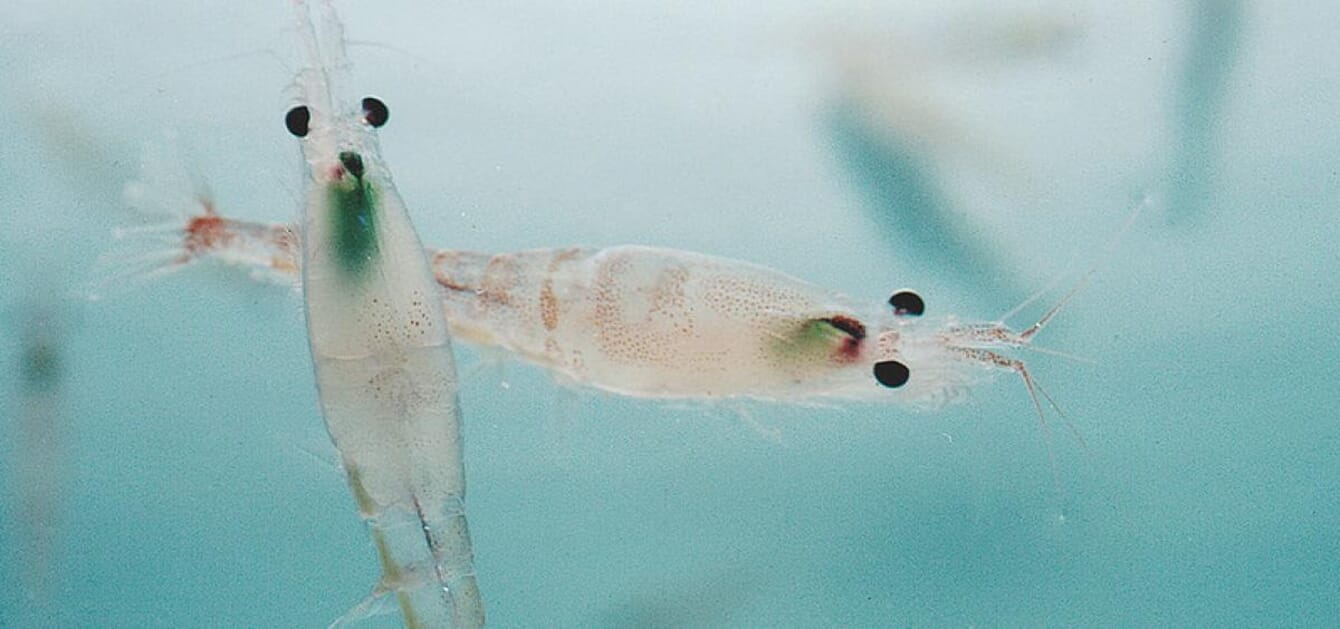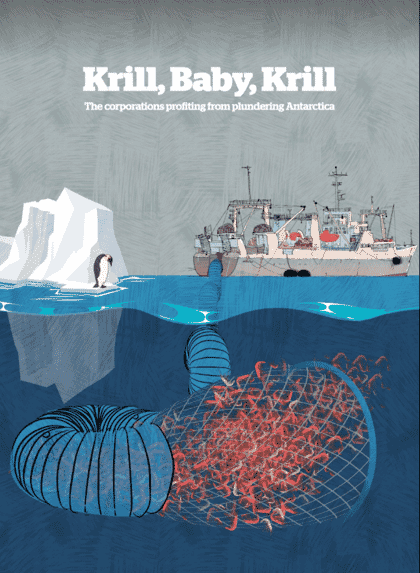
© Langdon Quetin
The report, by the Changing Markets Foundation, criticises the increasingly mainstream trade in krill for use in dietary supplements and aquafeeds. According to the Netherlands-based NGO, krill is “critical for planetary health and helps slow climate change by removing from the atmosphere the equivalent of emissions from 35 million cars each year.”
“This summer’s heat waves and droughts are a wakeup call that the climate emergency is upon us. Krill are not just amazing animals for their crucial role in the Antarctic food webs, they also help combat climate change. By continuing to sell krill-fed farmed salmon and pricey krill oil supplements leading supermarkets are complicit in depleting the main source of food for whales, seals and penguins, animals that are already under extreme pressure from global heating,” said Sophie Nodzenski, senior campaigner at the Changing Markets Foundation, in a press release.
Aker Biomarine is singled out as one of the main companies that benefit from the industry – being responsible for two thirds of the current Antarctic krill landings – and the NGO says that the krill fishing companies use “a range of industry tactics to downplay its damaging impacts, for example by using a range of consumer-based labels to greenwash their product as sustainable”.
It's an accusation that Aker BioMarine is quick to refute.
“We are not a company that needs to greenwash anything, we let CCAMLR’s [the Commission for the Conservation of Antarctic Marine Living Resources] science and precautionary management of krill and the independent and well documented MSC certification of our fishery speak for itself. But we always aim to improve, and we know that we have a responsibility to make the right decisions to secure a positive impact in a period when climate and nature is changing fast. This is why we are happy to engage actively and transparently with stakeholders, also from UK and Scotland, to ensure a best practice of the krill fishery in Antarctica,” Pål Einar Skogrand, VP policy and impact at Aker BioMarine told The Fish Site.
The Marine Stewardship Council, which certifies the fishery, is also adamant that Aker's activities are sustainable.
“Since 2010, the Aker BioMarine Krill fishery has been independently certified against the MSC-standard. The world’s largest, most rigorous, and comprehensive third-party certification program for wild capture fisheries. This fishery is currently part of the 5 percent of fisheries in the MSC that has no current conditions. The fishery is operating at catch levels well below what would generally be regarded as a precautionary upper level relative to the best estimates available of stock size. The fishery is managed within a precautionary and ecosystem approach,” said Gisli Gislason, program director MSC North Atlantic.
However Changing Markets argues that MSC certification lacks credibility.
“The industry has also been pushing the narrative that the current catch limit is precautionary because it is ‘only 1 percent of the krill biomass’, but this fails to reflect its impact on the vulnerable Antarctic ecosystem, particularly in the face of accelerating climate change. This illusion of sustainability is further enabled by the Marine Stewardship Council (MSC) which certifies krill-based products as sustainable, despite repeated objections by NGOs and scientists,” it declares.

Changing Markets calls for an immediate moratorium of the Antarctic krill fishery.
Retailers under fire
The reports authors state that krill oil dietary supplements were on sale in 88 percent of the 17 retailers they surveyed in North America, 75 percent of the eight retailers they surveyed in Asia and almost half of the 21 they surveyed in Europe.
In addition, the foundation says it ascertained that krill-fed farmed salmon products are sold by 16 leading supermarkets across four European countries: Auchan, Carrefour, Intermarché and Leclerc (France); Carrefour, Dia, Lidl and Mercadona (Spain); Aldi Nord, Edeka, Kaufland and Lidl (Germany); and Asda, Marks & Spencer, Sainsbury’s and Tesco (United Kingdom). All were linked to Aker BioMarine-sourced krill being used in their salmon supply chains.
Changing Markets points to the latest report from the Intergovernmental Panel on Climate Change (IPCC), which questioned the sustainability of krill harvesting and the viability of supply chains and advised producers to use alternatives.
The alternative?
Changing Markets calls for an immediate moratorium of the Antarctic krill fishery.
“Due to the repeated failures by the Commission for the Conservation of Antarctic Marine Living Resources (CCAMLR) to properly regulate the krill industry by tightening environmental protections and designating Marine Protected Areas, the Changing Markets Foundation calls for an immediate moratorium on Antarctic krill fishing. It also urges retailers, feed producers and fish farms to phase out the use of wild caught fish for aquaculture, including krill. It advises consumers to stop using krill oil health supplements and to ask their supermarkets to phase out the use of krill in farmed seafood,” it concludes.
The launch of the report coincides with the first ever World Krill Day, an occasion to bring awareness to the key role it plays in the Antarctic ecosystem.




